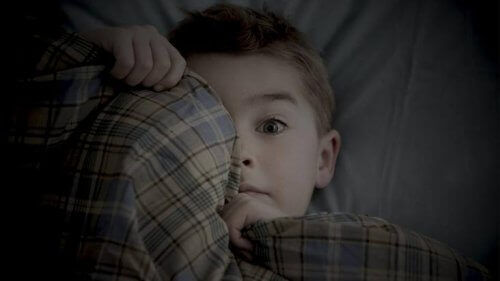Nightmares in Children: Characteristics and Their Causes

Nightmares in children are one of the most common sleep-related disorders during childhood. They usually begin when kids are about two years old.
Most children have nightmares at some point or another. It’s a very unpleasant experience, although it’s a normal part of human development.
Because these dreams cause fear in children, it’s necessary that parents take some sort of action to stop them. By doing this, you can help your children sleep more peacefully.
What are nightmares?
Nightmares are a type of frightening dream that causes feelings of anguish, fear, anxiety, and terror in the person dreaming them.
Generally, they occur towards the end of the night, when the individual is in a deep sleep. These vivid dreams are regularly followed by a sudden and complete awakening.
Causes of nightmares in children
These unconscious manifestations of our feelings sometimes occur without any apparent reason. However, there are specific reasons for nightmares to occur in children:
- A side effect of medication.
- A reaction to a traumatic situation that the child has experienced, such as a car accident or a natural disaster.
- Sometimes children have a vast imagination. Reading or listening to a story is more than enough to cause them to have a nightmare.
- Watching violent, scary or disruptive movies or TV shows just before going to sleep.
- Stressful situations, such as moving, problems at school, the death of a loved one, or their parents’ divorce.
- Suffering from a certain disease, a type of pain, or an injury such as a fracture.
- Being separated from their parents for a prolonged period or the birth of a sibling.
- Fatigue or over-excitement.

What can parents do when their children have nightmares?
Although we can’t prevent our children from having nightmares, we can take steps to help them feel relaxed when it’s time to go to sleep. Taking these precautions will reduce the number of nightmares in children.
Prepare the mood before putting the child to bed. It’s vital that their room feels cozy and is a place where they feel comfortable and calm.
Make sure that the moment before going to sleep is a moment of tranquility and relaxation. It’s recommended that you follow a bedtime routine.
For example, bathe your children, give them hugs, talk about nice things to them, play soft music, sing a song or give them a relaxing massage.
On the contrary, prevent your children from going to bed very hyped-up, or with some sort of digital screen at their fingertips. Try not to watch violent TV shows and don’t read scary stories before sending them to sleep.
Don’t allow them to do violent physical activities. Also, establish a regular schedule for waking up and falling asleep. This will help stop the problem.
One strategy to make children feel more secure is to sleep in the same room as them, or have them sleep near their siblings. Let them go to sleep with their favorite stuffed animal or blanket and tell them that this will be their dream protector.
Otherwise, allow them to sleep with a light on or make it so that the room isn’t completely dark. You can also play with their imagination by telling them that you’ll spray an aerosol in their room that’ll get rid of any monster and nightmare.
“Make sure that the moment before going to sleep is a moment of tranquility and relaxation. To do this, it’s recommended that you follow a bedtime routine.”
How to act after your children have a nightmare
If a child has experienced a nightmare, you can help by following these steps. Most likely, after a nightmare, the child will wake up terrified and call you for comfort.
You must attend to your kids immediately because your love and support are what they need to overcome their fears during this tense moment.
Reassure them and make them feel safe. Tell them who you are and that you won’t let anything bad happen to them.

On the other hand, don’t ask them to tell you the nightmare, since you’ll only make them remember it again. Be understanding, remind your children that it was only a bad dream, that the nightmares aren’t real and, therefore, nothing will happen to them.
Validate your emotions, say things to let them know you care about them. Make them feel understood.
Also, encourage them to go back to sleep. To reassure your children, you could leave a light on if that makes them feel better or leave a flashlight within reach.
In conclusion, many children have nightmares sporadically. Therefore, there’s no reason to be too alarmed or worried.
The most important thing is that children perceive their parent’s company and security during these episodes.
Nightmares in children are one of the most common sleep-related disorders during childhood. They usually begin when kids are about two years old.
Most children have nightmares at some point or another. It’s a very unpleasant experience, although it’s a normal part of human development.
Because these dreams cause fear in children, it’s necessary that parents take some sort of action to stop them. By doing this, you can help your children sleep more peacefully.
What are nightmares?
Nightmares are a type of frightening dream that causes feelings of anguish, fear, anxiety, and terror in the person dreaming them.
Generally, they occur towards the end of the night, when the individual is in a deep sleep. These vivid dreams are regularly followed by a sudden and complete awakening.
Causes of nightmares in children
These unconscious manifestations of our feelings sometimes occur without any apparent reason. However, there are specific reasons for nightmares to occur in children:
- A side effect of medication.
- A reaction to a traumatic situation that the child has experienced, such as a car accident or a natural disaster.
- Sometimes children have a vast imagination. Reading or listening to a story is more than enough to cause them to have a nightmare.
- Watching violent, scary or disruptive movies or TV shows just before going to sleep.
- Stressful situations, such as moving, problems at school, the death of a loved one, or their parents’ divorce.
- Suffering from a certain disease, a type of pain, or an injury such as a fracture.
- Being separated from their parents for a prolonged period or the birth of a sibling.
- Fatigue or over-excitement.

What can parents do when their children have nightmares?
Although we can’t prevent our children from having nightmares, we can take steps to help them feel relaxed when it’s time to go to sleep. Taking these precautions will reduce the number of nightmares in children.
Prepare the mood before putting the child to bed. It’s vital that their room feels cozy and is a place where they feel comfortable and calm.
Make sure that the moment before going to sleep is a moment of tranquility and relaxation. It’s recommended that you follow a bedtime routine.
For example, bathe your children, give them hugs, talk about nice things to them, play soft music, sing a song or give them a relaxing massage.
On the contrary, prevent your children from going to bed very hyped-up, or with some sort of digital screen at their fingertips. Try not to watch violent TV shows and don’t read scary stories before sending them to sleep.
Don’t allow them to do violent physical activities. Also, establish a regular schedule for waking up and falling asleep. This will help stop the problem.
One strategy to make children feel more secure is to sleep in the same room as them, or have them sleep near their siblings. Let them go to sleep with their favorite stuffed animal or blanket and tell them that this will be their dream protector.
Otherwise, allow them to sleep with a light on or make it so that the room isn’t completely dark. You can also play with their imagination by telling them that you’ll spray an aerosol in their room that’ll get rid of any monster and nightmare.
“Make sure that the moment before going to sleep is a moment of tranquility and relaxation. To do this, it’s recommended that you follow a bedtime routine.”
How to act after your children have a nightmare
If a child has experienced a nightmare, you can help by following these steps. Most likely, after a nightmare, the child will wake up terrified and call you for comfort.
You must attend to your kids immediately because your love and support are what they need to overcome their fears during this tense moment.
Reassure them and make them feel safe. Tell them who you are and that you won’t let anything bad happen to them.

On the other hand, don’t ask them to tell you the nightmare, since you’ll only make them remember it again. Be understanding, remind your children that it was only a bad dream, that the nightmares aren’t real and, therefore, nothing will happen to them.
Validate your emotions, say things to let them know you care about them. Make them feel understood.
Also, encourage them to go back to sleep. To reassure your children, you could leave a light on if that makes them feel better or leave a flashlight within reach.
In conclusion, many children have nightmares sporadically. Therefore, there’s no reason to be too alarmed or worried.
The most important thing is that children perceive their parent’s company and security during these episodes.
All cited sources were thoroughly reviewed by our team to ensure their quality, reliability, currency, and validity. The bibliography of this article was considered reliable and of academic or scientific accuracy.
- Schredl, M., Fricke-Oerkermann, L., Mitschke, A., Wiater, A., & Lehmkuhl, G. (2009). Longitudinal study of nightmares in children: stability and effect of emotional symptoms. Child psychiatry and human development, 40(3), 439-449. https://link.springer.com/article/10.1007/s10578-009-0136-y
- Schredl, M., & Pallmer, R. (1997). Nightmares in children. Praxis der Kinderpsychologie und Kinderpsychiatrie, 46(1), 36-56. https://europepmc.org/article/med/9102641
- Convertini, G., Krupitzky, S., Tripodi, M. R., & Carusso, L. (2003). Trastornos del sueño en niños sanos. Arch argent pediatr, 101(2), 99-105. https://pdfs.semanticscholar.org/1ec9/cc36e4bebf8d4fdf0d4f607125bf51ecbe03.pdf
- Egea, J. N. (2006). SUEÑOS Y PESADILLAS. International Journal of Developmental and Educational Psychology, 3(1), 265-279. https://www.redalyc.org/pdf/3498/349832314024.pdf
This text is provided for informational purposes only and does not replace consultation with a professional. If in doubt, consult your specialist.








